2024 GMC Yukon Denali
| The Good: – Immensely spacious – Cabin tech and comfort – Handles well for its size |
The Bad: – Immense outer size – Fuel economy tumbles when pushed – Few hard plastic interior bits |
The GMC Yukon comes in many flavours. The long one is called the Yukon XL. The offroad one is called the Yukon AT4. Then there’s a more mainstream one called the Chevy Tahoe. And a pickup version that goes by Sierra and Silverado nameplates. And an uber-luxurious one called the Cadillac Escalade.
Jokes aside, GM’s T1XX full-size platform is highly lucrative and forms the basis for a variety of their best-selling models. And the company has done a respectable job of offering enough choices for potential buyers that they wouldn’t deviate towards other carmakers.
The Yukon is the Tahoe’s slightly more handsome cousin, and the one we’re checking out here is the top-dog Denali version with the biggest engine in its class.
Exterior
Historically, the Yukon has been seen as a more upscale alternative to the Tahoe, despite both vehicles sharing almost every part except the front end and badges. However, with the 2021 redesign, General Motors has gone further in setting the two SUVs apart, creating distinct personalities for each.
The Yukon is the most handsome of its siblings, and the Denali looks undeniably premium. Taking its place one rung below its Cadillac cousin, the top-tier GMC comes with an elegant chrome grille, extensive chrome accents, power-retracting side steps, quad exhaust tips and a lower-lipped front bumper compared with the more off-road-ready AT4 version.
In terms of size, the Yukon is far bigger than any of its local Japanese rivals, and only eclipsed in length by the slow-selling Jeep Grand Wagoneer. If you want an even bigger vehicle, there is the Yukon Denali XL that adds 391 mm to the length, with an additional 335 mm in the wheelbase.
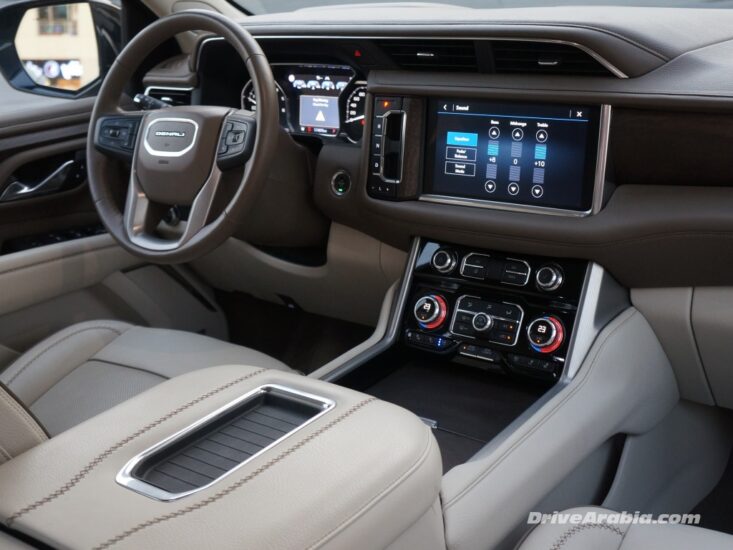
Interior
But the “regular” Yukon is already plenty big. Step inside, and you’ll find a palatial interior that feels both modern and sophisticated, though it retains a conservative design approach. The dashboard layout is exclusive to the Yukon, setting it apart from both the Tahoe and the fancier Cadillac Escalade.
The pricey Denali is suitably outfitted with soft-touch materials and padded leatherette all over the dash, door panels and parts of the centre console, with wide-bodied leather seats. However, there are still a few areas, particularly in the lower parts of the interior, where hard plastics detract from the overall sense of luxury.
One of the biggest complaints about the previous Yukon was its cramped third row, an issue caused by the old solid-axle rear suspension taking up space. For 2021, the vehicle grew to 5,352 mm in length and finally got an independent rear suspension. The result is a much roomier cabin, especially in the third row, which can comfortably accommodate adults.
Even with all seats in use, the cargo space is superior to rivals like the ever-popular Nissan Patrol, which hasn’t grown even with its own recent redesign. And if you fold the third row flat, the Yukon becomes a true minivan-like cargo-hauler. The second-row seats in the Yukon can also slide and fold down, allowing for even greater flexibility. In terms of sheer interior volume, the only real competitors are the other American full-sizers from Ford and Jeep.
Convenience and comfort
When it comes to technology, the Yukon doesn’t disappoint. The loaded Denali includes full LED lighting, a 10.2-inch touchscreen that’s both responsive and user-friendly, a 12-inch gauge cluster display, a 15-inch heads-up display, a standard 14-speaker Bose sound system, and wireless connectivity for both Apple CarPlay and Android Auto, aside from a subscription to GM’s OnStar service.
For rear passengers, there are optional dual 12.6-inch touchscreen displays, wireless headphones, and multiple USB and HDMI ports, aside from the panoramic glass roof and separate rear controls for the good tri-zone auto a/c.
Additional high-end features include wireless charging, 360-degree cameras, and a rear-view mirror that doubles as a camera. The power-operated tailgate can be activated with a foot gesture, and there’s even a cooler in the huge centre console. The P-R-N-D gear selector is a bunch of buttons on the left of the touchscreen, but thankfully many core features still feature their own set of buttons and dials below the screen.
GMC Yukon Safety
In terms of safety, the Yukon comes with 7 airbags and a full suite of advanced driver assistance systems, including adaptive cruise control, lane-keeping assist, emergency/pedestrian braking and even reverse automatic braking.
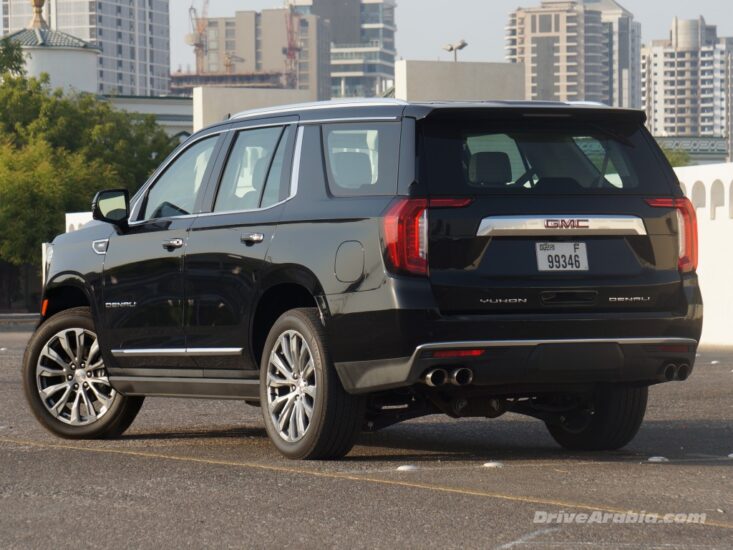
GMC Yukon engine specifications
Under the hood, the standard Yukon comes equipped with a 5.3-litre V8 engine, producing 355 hp and 518 Nm of torque. However, the Denali only comes with a 6.2-litre V8, the same motor found in the Escalade. It makes a still-impressive 420 hp at 5600 rpm and 624 Nm of torque at 4100 rpm. Paired with a smooth-shifting 10-speed automatic transmission, this is one strong powertrain, and rather enjoys being pushed even at higher revs. It’s a far more suitable engine for this big SUV than the easily-overwhelmed 5.3-litre in lesser Yukons.
The Denali’s all-wheel-drive system is switchable between auto, two-wheel-drive and four-wheel drive, and it also includes low-range gearing.
GMC Yukon performance
Despite its size, the Denali managed a respectable 0-100 kph time of 6.9 seconds during our summer testing. While the big V8’s low-end kick is pretty good, the Ford Expedition’s turbocharged V6 engine delivers noticeably stronger early torque on short sprints, though we expect the Denali to eventually catch up and surpass it in a hypothetical straight-line race, while also sounding better. GM remains the last contender in the full-size segment to still offer a V8.
Of course, V8 performance comes at a cost, particularly when it comes to fuel consumption. When driven aggressively, the Denali’s fuel consumption can go as high as 20 litres/100 km (5 km/litre). However, with more relaxed highway cruising, the cylinder deactivation system and auto start/stop system helped up achieve a more respectable average of 14.8 litres per 100 km (6.8 km/litre).
On the road, the Yukon Denali’s ride is remarkably smooth, even with massive 22-inch wheels wrapped in 275/50 tyres, largely due to the efforts of the remarkable Magnetic Ride Control adaptive suspension. This, combined with the new independent rear suspension, provides a comfortable, almost luxury-car-like ride. Road noise is kept to a minimum, and the cabin remains impressively quiet.
GMC Yukon Handling and Off-road
In terms of handling, the Yukon doesn’t quite match the agility of some of its indirect European competitors, but it holds its own. While it’s not a vehicle you’ll be throwing around corners with enthusiasm, it feels stable and composed in everyday driving situations. The steering is weighted a bit light and lacks feedback, but that’s fine. The brakes are also more than sufficient.
It’s worth noting that despite its improvements, the Yukon remains a very large SUV, and manoeuvring it in tight spaces requires some getting used to. However, thanks to its 360-degree cameras and parking sensors, even challenging parking situations are manageable with a bit of patience.
Off the pavement, the Yukon retains some level of offroad capability, though its size can be a limiting factor. The V8 engine and low-range gearing allow it to tackle shallow dunes without any tension, and the air suspension can raise the vehicle by 2 inches (50 mm) for added ground clearance.
Aside from hill descent control, there is even a Traction Select system that allows you to quickly switch between multiple terrain modes to optimise powertrain calibrations, traction control settings and stability control system calibrations. However, serious off-roading is best left to the GMC Yukon AT4, which offers better approach angles and more rugged tyres.
Verdict
Ultimately, the GMC Yukon is one of the largest and most capable family SUVs available today. While the decision between it and the Chevy Tahoe or even any of its rivals may come down to personal preference, the Yukon offers a blend of luxury, practicality and off-road capability that few other vehicles can match at its price point, however high it is. For those comfortable with its size and old-school engine, the Yukon keeps up with the times pretty well in our books.
Photos by Marouf Hussain Chowdhury.
| Price Range: Dh 324,000 – 347,000 Current Model Introduced in: Body Styles: Engines: Transmissions: Setup: Suspension: |
Brakes: Front: discs Rear: discs Curb Weight: Length: Wheelbase: Top Speed: Test Acceleration 0-100 kph: Observed Test Fuel Economy: |
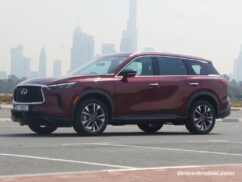
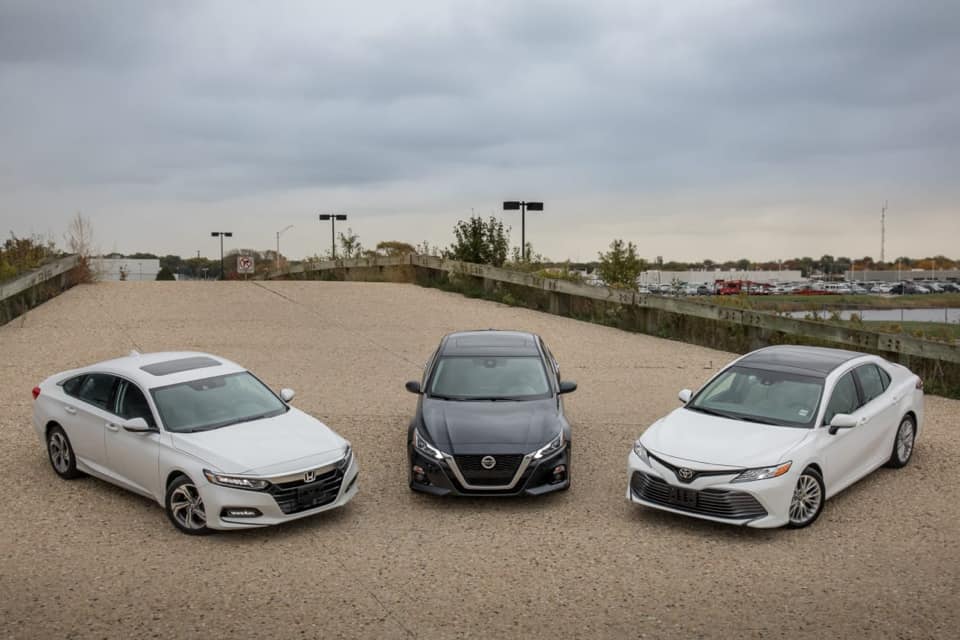
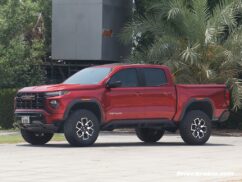
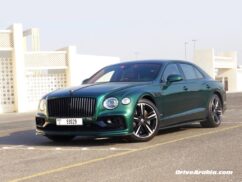
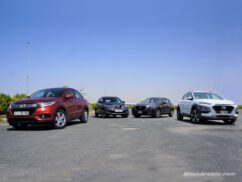
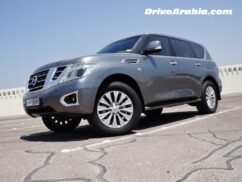
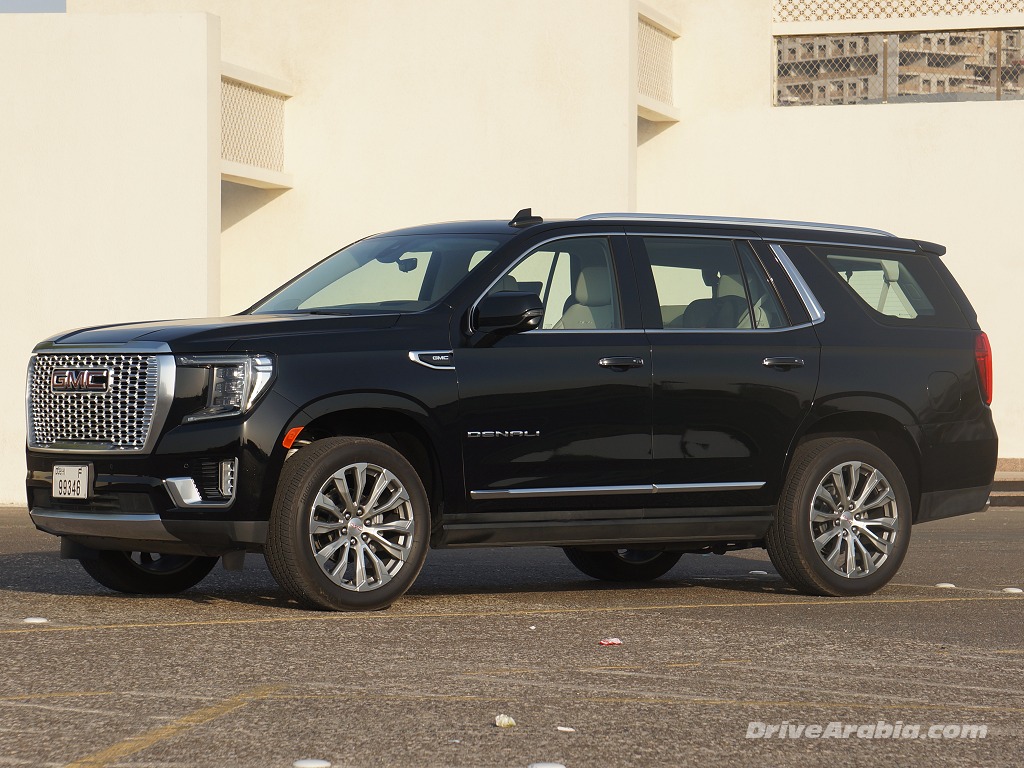
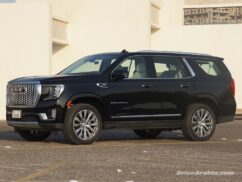
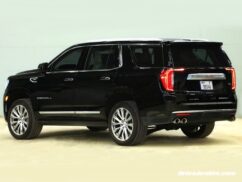
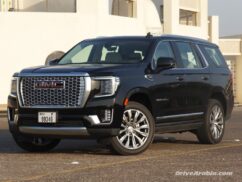
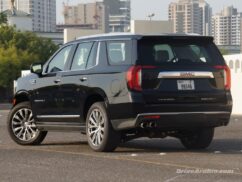
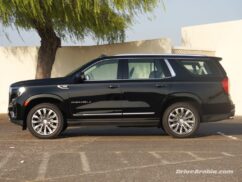
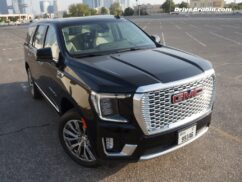
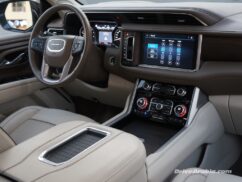
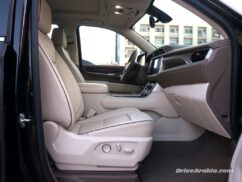
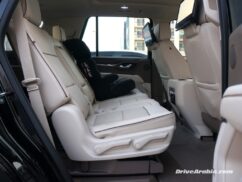
Comments
Zi
pls update the price, its heavily underquoted and misleading!
Marouf Hussain Chowdhury
Thanks for the heads up. We have updated the pricing.